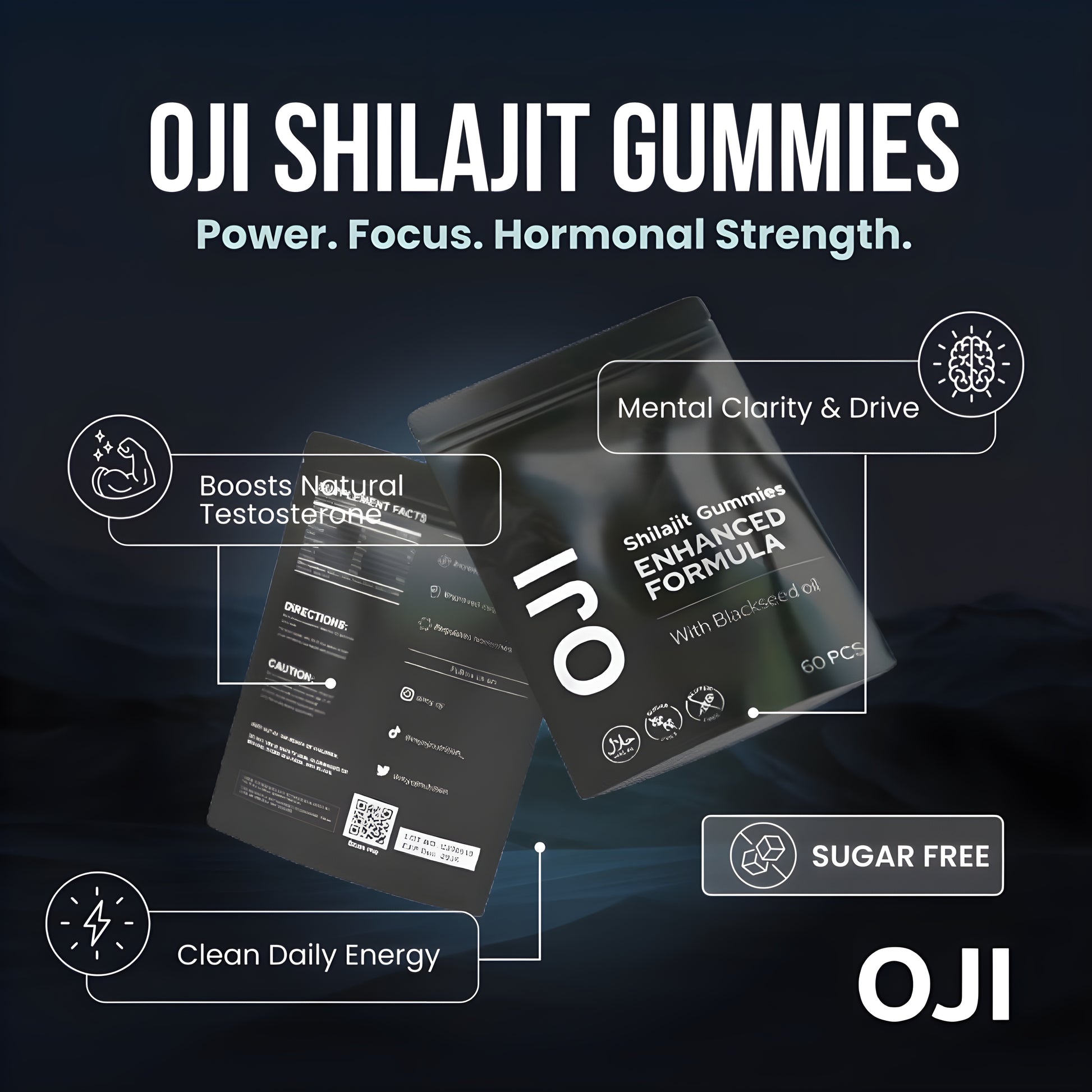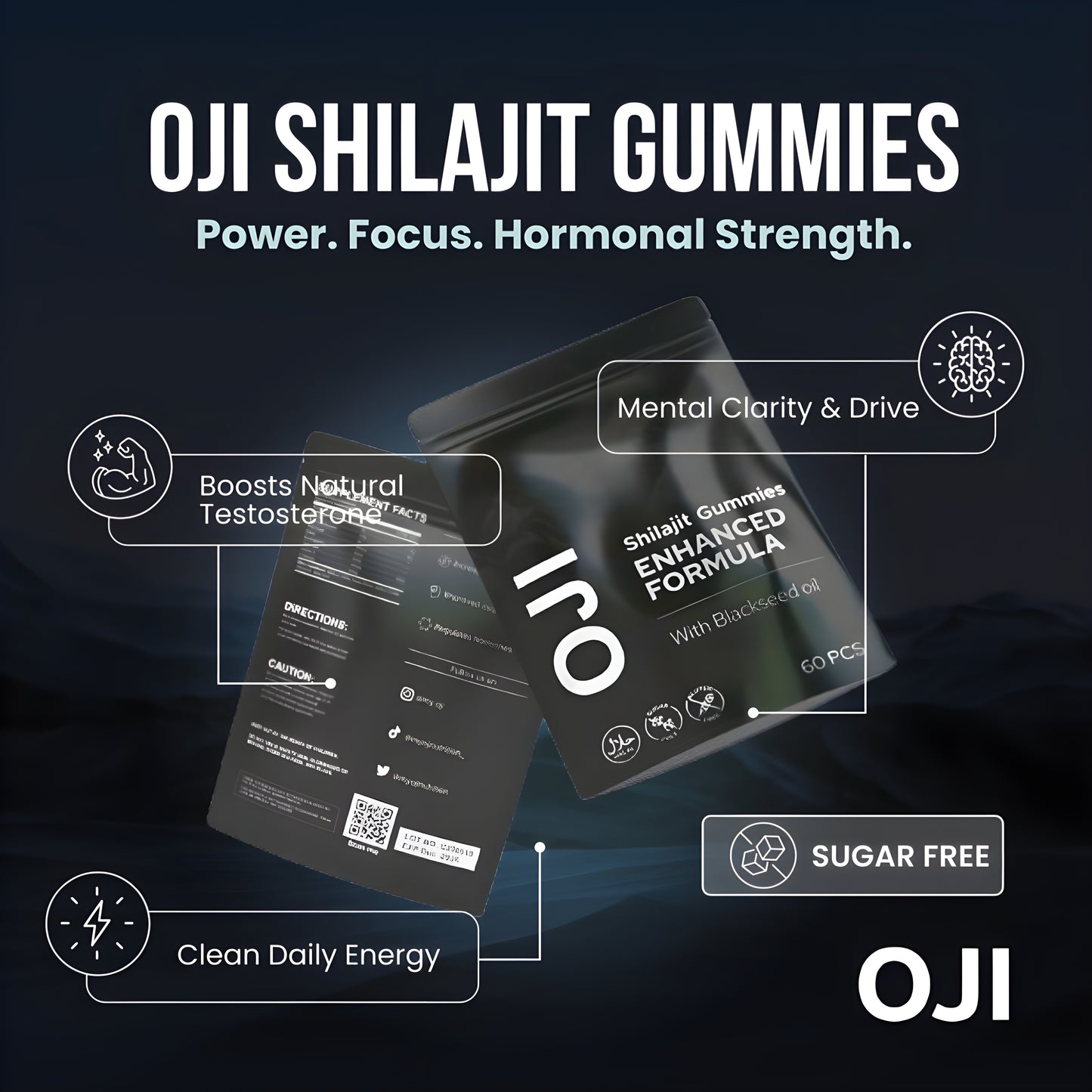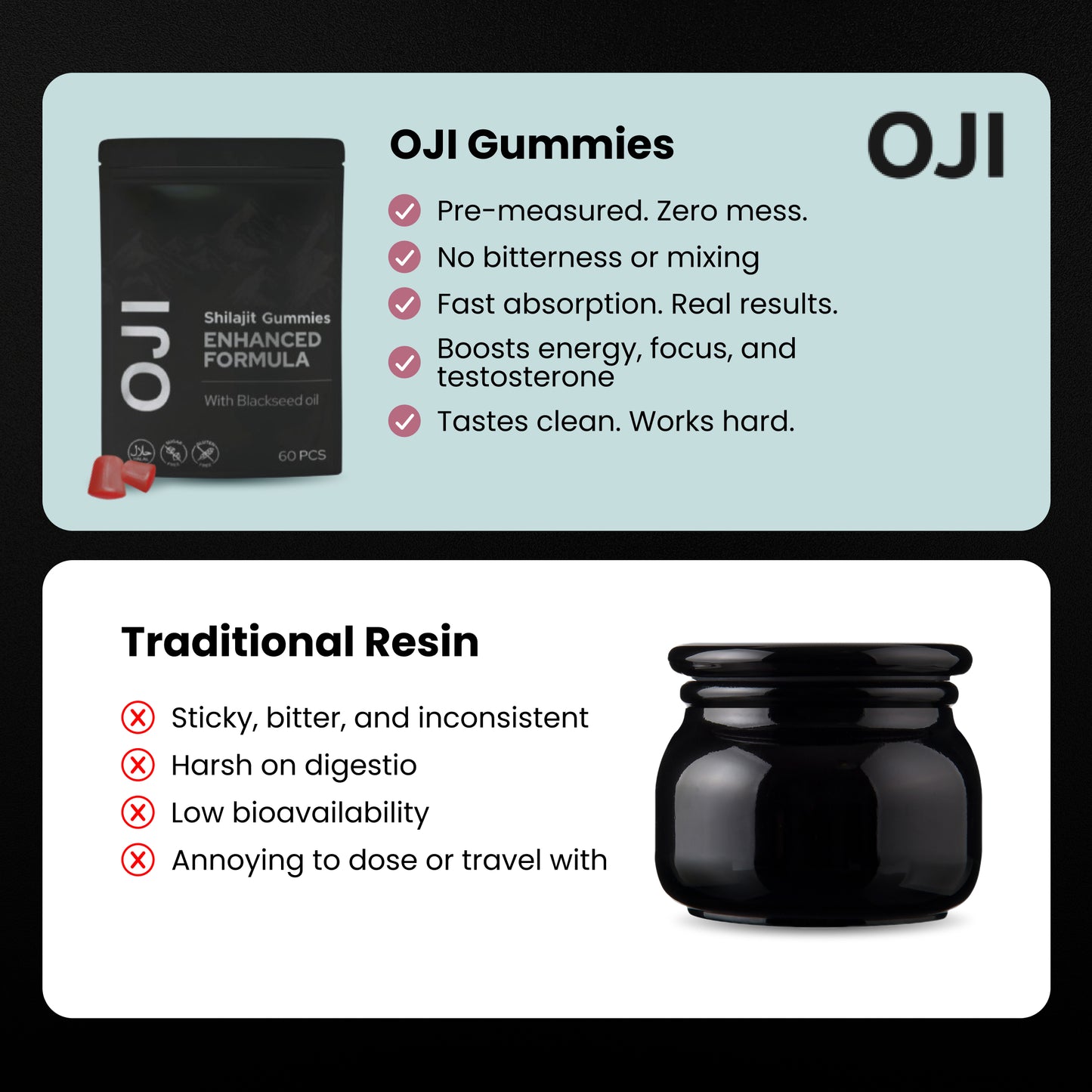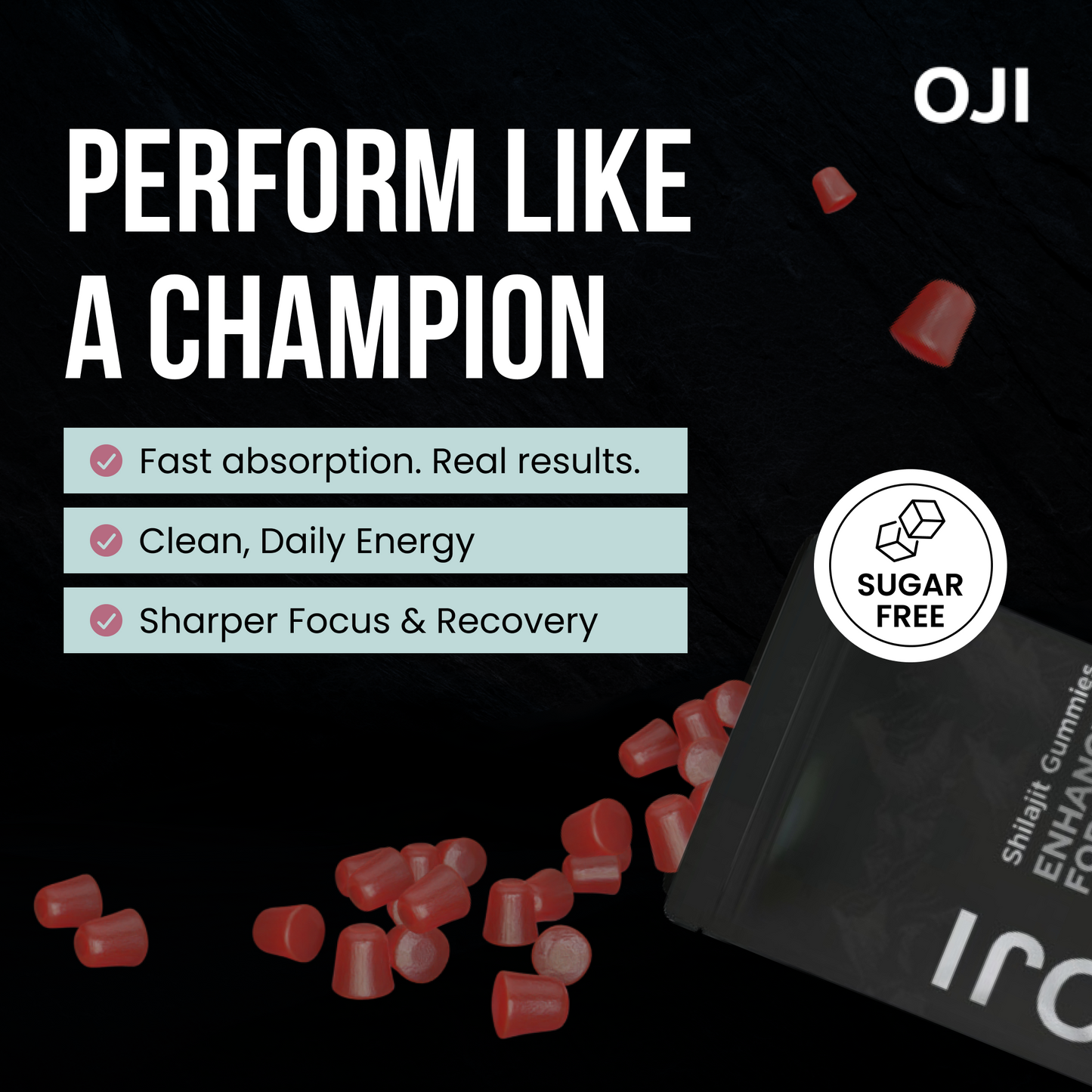Chronic stress is a quiet troublemaker. It subtly disrupts your body’s natural rhythm, turning what should be a temporary survival tool into a long-term state of damage. This constant pressure affects everything from your nervous system to your heart, often long before you even realise something is wrong.
The real problem is when your ‘fight-or-flight’ response gets stuck and never quite switches off, leading to widespread wear and tear on your internal systems.
Your Body's Alarm System Is Stuck on High Alert
Think of your body's stress response as a super-effective fire alarm. When it senses an immediate threat, like swerving to avoid a car, it blares loudly. Hormones like adrenaline and cortisol flood your system, your heart races, and your muscles get tight—all designed to help you either fight the danger or run from it. It's a brilliant survival mechanism. Once the danger is gone, the alarm goes quiet, and your body gets back to normal.
But with chronic stress, it’s like that alarm is jammed in the 'on' position. The threat—whether it's work deadlines, money worries, or relationship troubles—feels like it never goes away. As a result, your body stays in a constant state of high alert, endlessly pumping out stress hormones. This is where the real damage starts to set in.
The Ripple Effect Across Key Body Systems
This constant state of readiness simply isn't sustainable. Instead of protecting you, the system starts to weaken the very structures it was designed to defend, creating a cascade of negative effects throughout your body.
- Nervous System: The part of your nervous system that handles ‘fight-or-flight’ becomes completely overworked. This can lead to anxiety, irritability, and sheer mental exhaustion as it drains your body's energy.
- Cardiovascular System: Your heart is forced to work harder for longer, and your blood vessels can get tighter. This sustained strain can lead to high blood pressure and increase the risk of heart problems down the line.
- Immune System: While short bursts of stress can give your immune system a temporary boost, long-term exposure to cortisol actually suppresses it. This leaves you more vulnerable to picking up infections and can slow down your recovery time.
This infographic gives a great visual of how chronic stress branches out to impact these three core body systems.
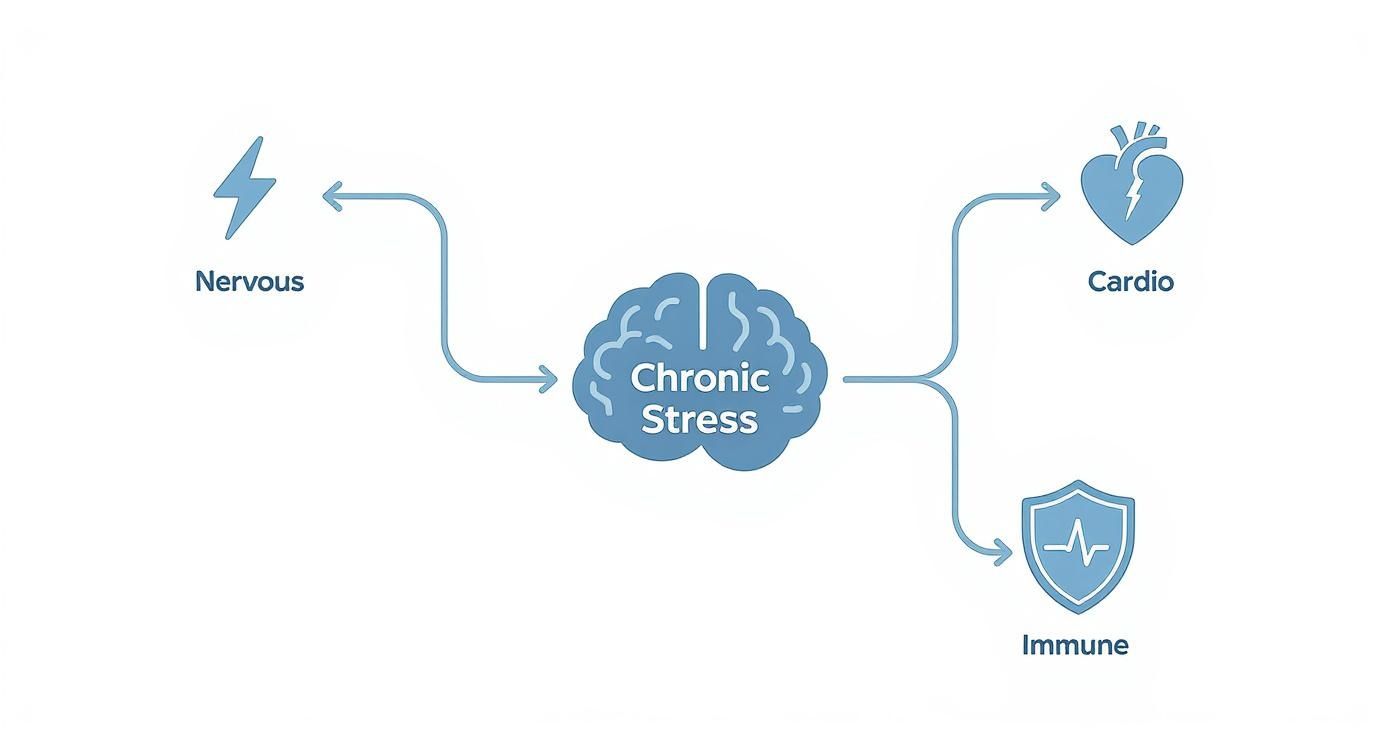
As you can see, what starts as a single issue in the brain quickly spreads, affecting your body's main defence, circulatory, and communication networks.
To quickly summarise how these systems are affected, here’s a breakdown:
Key Body Systems Affected by Chronic Stress
| Body System | Primary Role | Common Effects of Chronic Stress |
|---|---|---|
| Nervous System | Communication and coordination | Anxiety, irritability, mental fatigue, trouble concentrating. |
| Cardiovascular System | Pumping blood and oxygen | High blood pressure, increased heart rate, higher risk of heart attack. |
| Immune System | Defending against illness | Lowered resistance to colds and flu, slower wound healing. |
These interconnected effects show just how deeply stress can impact our physical health from multiple angles.
And this isn't a niche problem. In the UK, a staggering 74% of people have felt so stressed in the past year that they were completely overwhelmed and unable to cope.
This widespread pressure leads to very real physical symptoms. 46% reported turning to unhealthy eating habits, while the majority experienced increased anxiety (61%) and feelings of depression (51%) as a direct result. You can learn more by reading up on these stress statistics and their impact.
The Cortisol Connection to Fatigue and Brain Fog
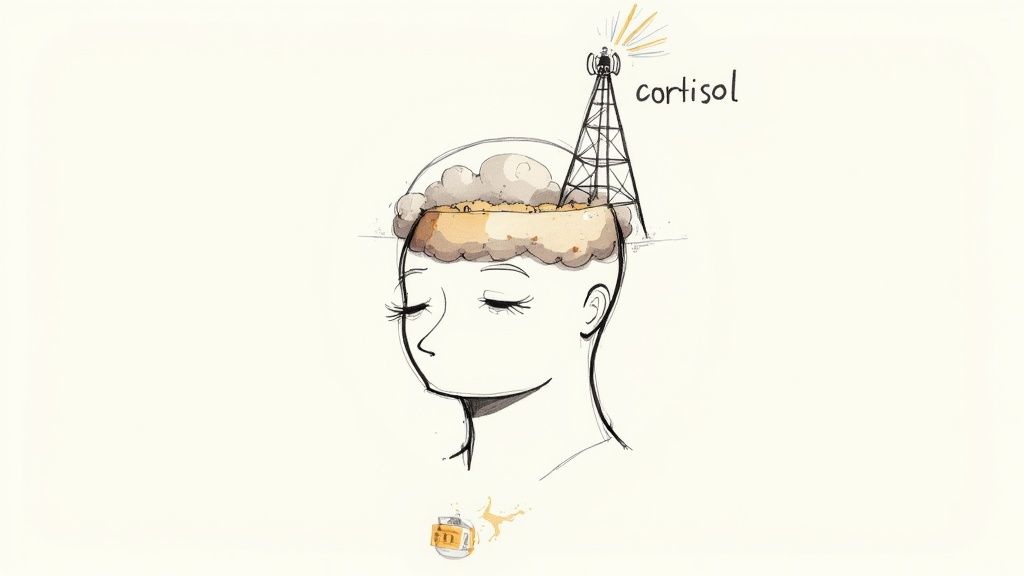
When your body's internal alarm system is stuck in the 'on' position, your adrenal glands pump out a relentless supply of cortisol. You might know it as the primary stress hormone. While it’s a lifesaver in short bursts, chronically high levels are a key reason behind the deep physical and mental exhaustion that comes with long-term stress.
Think of cortisol as your body’s emergency power generator. It floods your system with glucose for a quick energy surge, getting you ready to fight or flee. But when that generator runs non-stop, it starts to drain your main power grid. The result? You feel completely depleted, even after a full night's sleep.
This hormonal chaos is one of the most significant impacts of chronic stress on the body. It creates a state of constant fatigue that no amount of rest seems to fix, making even the smallest daily tasks feel like climbing a mountain.
Why You Feel So Tired and Unfocused
When cortisol levels stay high around the clock, they throw your natural sleep-wake cycle completely out of whack. Normally, cortisol peaks in the morning to get you up and going, then slowly tapers off by bedtime. Chronic stress flips this rhythm on its head. You end up feeling wired and anxious at night, only to wake up groggy and exhausted.
This lack of quality sleep has a direct knock-on effect on your brain, leading to that frustrating feeling we call "brain fog."
Brain fog isn't just about feeling a bit tired; it's a real cognitive dip driven by hormonal imbalance. It shows up as trouble concentrating, memory lapses, and a maddening inability to think clearly.
This mental haze happens because persistently high cortisol can interfere with key areas of the brain, like the hippocampus—the bit responsible for memory and learning. It’s why you might struggle to remember names or find it hard to make decisions when you’re under constant pressure. Your brain is so busy being on high alert that it can't handle its more complex jobs properly.
Taking Action Against Cortisol Imbalance
Recognising the link between cortisol and how you’re feeling is the first, most important step. To get back on track, you need to focus on calming your stress response and giving your adrenal glands a much-needed break. Here are a few practical steps to get you started:
- Prioritise Restorative Sleep: Stick to a consistent sleep schedule. Create a relaxing routine before bed—dim the lights, put your phone away an hour beforehand, and make sure your bedroom is a cool, dark sanctuary. This helps your natural cortisol rhythm find its way back.
- Engage in Mindful Movement: Gentle activities are your friend here. Think yoga, tai chi, or just a peaceful walk. These can help lower cortisol without putting more strain on your already tired body. High-intensity workouts can sometimes spike cortisol, so always listen to what your body is telling you.
- Balance Your Blood Sugar: Step away from sugary snacks and refined carbs that send your energy on a rollercoaster. Instead, focus on whole foods packed with fibre, protein, and healthy fats. This will give you stable, consistent energy all day long.
If you’re looking for a more detailed guide, learning how to lower cortisol levels naturally can offer a clear roadmap to restoring that hormonal balance and finally shaking off the fatigue and brain fog.
Protecting Your Heart from Long-Term Stress
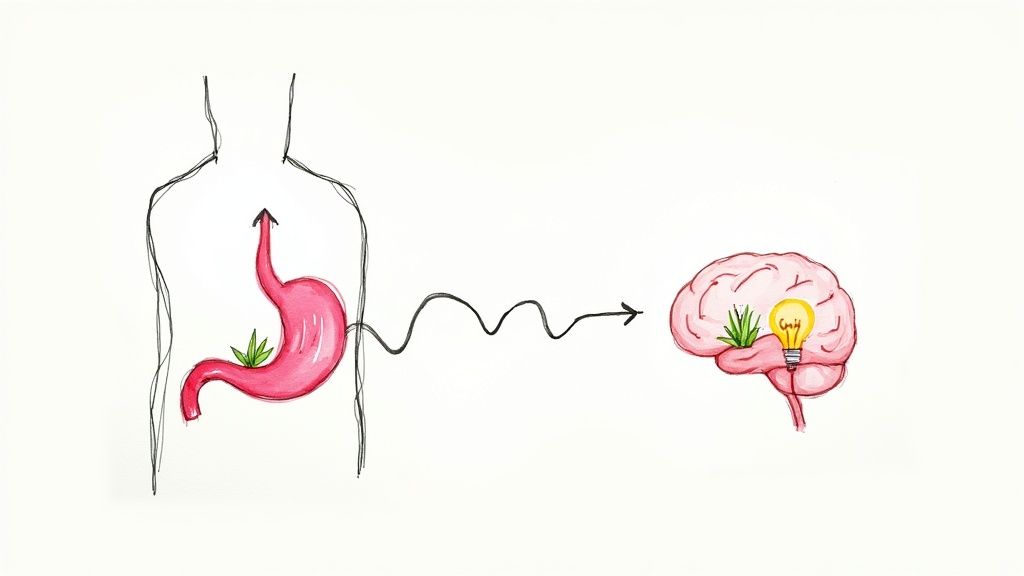
When stress isn't just a fleeting moment but a constant companion, your cardiovascular system often takes the biggest hit. It's on the front line, bearing the brunt of the pressure day in and day out.
Imagine your heart is a high-performance engine. Under chronic stress, that engine is forced to redline for months, maybe even years. That kind of relentless demand is bound to cause some serious wear and tear.
It all starts with stress hormones like adrenaline and cortisol. These are the body's alarm signals, telling your heart to pump faster and harder while also constricting your blood vessels. The result? Your blood pressure skyrockets. While this is incredibly useful for a short-term crisis, keeping it up long-term is like driving everywhere with your foot jammed on the accelerator.
This sustained high pressure puts an immense strain on your artery walls, which can lead to damage over time. They lose their flexibility and become vulnerable to a host of other issues. It’s a stark reminder that managing the chronic stress effects on the body isn't just about feeling calmer – it's about physically protecting your heart.
The Hidden Danger of Inflammation
Beyond the obvious mechanical strain, chronic stress has a quieter, more sinister side effect: chronic inflammation. Normally, inflammation is your body’s go-to repair crew, fixing injuries and fighting off invaders. But when stress keeps the alarm bells ringing, that inflammatory response never gets the signal to stand down.
This low-grade, persistent inflammation starts to damage the delicate inner lining of your arteries. Think of it like sandpaper rubbing against a smooth surface. This creates rough patches where cholesterol and other substances can easily latch on and build up, forming dangerous plaques. This is a condition known as atherosclerosis, a major player in heart disease.
The constant flood of stress hormones is a direct contributor to inflammation within your cardiovascular system, especially in the coronary arteries. This is why getting a handle on stress is a non-negotiable strategy for helping to prevent heart attacks and strokes.
Practical Steps to Safeguard Your Cardiovascular Health
Looking after your heart means taking real, actionable steps to ease the load on your circulatory system and calm that fiery inflammatory response. The aim is simple: give your engine a chance to cool down and get back to a healthy, sustainable rhythm.
- Get into Rhythmic Exercise: Activities like brisk walking, swimming, or cycling are fantastic. They strengthen the heart, get your blood moving, and help lower blood pressure. Remember, consistency is far more important than intensity.
- Adopt a Heart-Healthy Diet: Fill your plate with foods that fight inflammation. We’re talking colourful fruits and vegetables, oily fish packed with omega-3s, and whole grains. Cutting back on processed foods, sugar, and unhealthy fats can make a huge difference to arterial inflammation.
- Make Time for Relaxation: It doesn’t have to be complicated. Simple practices like deep breathing, a few minutes of meditation, or just spending time in nature can switch on your body’s relaxation response. This actively works against stress hormones, bringing down your heart rate and blood pressure.
By taking these steps, you’re doing more than just managing your feelings. You're actively defending your heart from the very real physical damage that chronic stress can cause.
Why Stress Makes You More Susceptible to Sickness
Ever noticed how you seem to catch every cold going around during a really tough time at work or home? It’s not just a run of bad luck. There's a real, powerful connection between your mind and your immune system, and when stress sticks around for too long, it can seriously weaken your body’s defences.
Think of your immune system as a highly trained security team, constantly on patrol for invaders like viruses and bacteria. When you're healthy and balanced, this team is sharp, vigilant, and effective. Chronic stress, however, is like putting that team on a constant, high-alert emergency status. Eventually, they get exhausted and distracted, leaving gaps in your body's security.
The main hormone behind this breakdown is cortisol. While short, sharp bursts of cortisol can actually give the immune system a temporary boost, a continuous flood of it does the exact opposite. It actively suppresses your immune system by lowering the number of lymphocytes—the crucial white blood cells that act as the front-line soldiers in the fight against infection.
A Distracted Defence Force
When your body is constantly funnelling all its energy towards managing what it thinks is a threat, there are simply fewer resources left for essential background jobs like keeping your immune system running. This is one of the most dangerous effects of chronic stress, as it leaves you wide open to getting sick.
This state of suppressed immunity means you're not only more likely to fall ill when exposed to a bug, but you'll probably take longer to recover, too. Your body just can’t mount the swift, strong defence it normally would.
And it’s not just about catching the common cold. Prolonged stress can also fire up or worsen inflammatory conditions. The same hormonal chaos that weakens your defences against germs can also cause your immune system to overreact internally. This can lead to chronic inflammation, which is linked to everything from skin problems to more serious autoimmune disorders.
Strengthening Your Immune Resilience
The best way to protect yourself is to actively take the strain off your immune system. By getting your stress levels under control, you give your body’s security force a chance to regroup and get back to its main job: keeping you healthy.
Here are a few actionable steps to get started:
- Focus on Nutrient-Dense Foods: Your immune cells need good fuel to function. Try to pack your diet with vitamins and minerals from a rainbow of colourful fruits and vegetables. Zinc (found in seeds and lentils) and Vitamin C (in citrus and peppers) are particularly important.
- Embrace Restorative Sleep: Sleep is prime time for your body’s repair work. It’s when you produce and release cytokines, special proteins that target infection and inflammation. Aim for 7-9 hours of quality sleep a night.
- Incorporate Gentle Movement: You don't need to run a marathon. Regular, moderate exercise like a brisk walk, yoga, or swimming can help reduce inflammation and encourage your immune cells to regenerate.
- Consider Immune Support: Natural compounds can offer extra support. For example, elderberry and echinacea have been traditionally used to support immune function, especially during challenging times.
Taking these steps is a great way to start pushing back against the immune-suppressing effects of stress. If you'd like to learn more, our guide on the top natural immune system boosters offers even more strategies for fortifying your body’s natural defences.
Rebalancing Your Gut and Mind Under Pressure
Ever felt that flutter of ‘butterflies in your stomach’ before a big presentation? That’s the gut-brain axis in real time—a direct, two-way communication line between your digestive system and your head. But when stress becomes chronic, that highway gets clogged with alarm signals, causing a major pile-up at both ends.
When your brain senses danger, it unleashes a flood of stress hormones. This chemical cascade hits your gut hard, slowing digestion right down, sparking inflammation, and messing with the delicate ecosystem of trillions of microbes that live there. The result? Those all-too-familiar feelings of indigestion, bloating, and cramps start showing up uninvited, day after day.
It's not a one-way street, though. A gut that’s been thrown out of whack by stress doesn't suffer in silence. It fires its own distress signals straight back to the brain, which can crank up feelings of anxiety and low mood. You end up in a nasty feedback loop: a stressed mind upsets the gut, and an upset gut stresses the mind.
The Cognitive Toll of a Stressed System
This constant gut-brain chaos is also why you might feel like you're walking through a mental fog. When your brain is stuck in high-alert, it diverts energy away from complex thinking to focus on survival. Suddenly, you're forgetting names, struggling to concentrate, and finding it impossible to make clear decisions.
Think of it like this: your brain is forced into a permanent survival mode. It prioritises being on high alert for threats over everything else, including memory recall and focus. Over time, this can even impact critical brain areas responsible for memory, like the hippocampus.
This pressure doesn't hit everyone the same way. In the UK, it’s often younger adults aged 18-24 who feel it most intensely, reporting higher stress levels and being more likely to call in sick due to mental health struggles. On the other hand, those over 65 generally report lower levels of psychological distress, showing just how differently we cope with these challenges at various stages of life.
Actionable Steps for Gut and Mind Harmony
Getting this sensitive system back in balance means looking after both your mind and your gut at the same time. Here are four practical actions you can take:
- Feed Your Good Bacteria: Make your plate a rainbow of fibre-rich plant foods. This is what your good gut microbes thrive on. Fermented foods like natural yoghurt, kefir, and sauerkraut are also great for introducing more friendly bacteria.
- Eat Mindfully: Slow down. Rushing through meals when you're stressed is a recipe for digestive disaster. Take a moment to chew properly and actually taste your food, free from distractions. This simple act tells your gut it's safe to digest properly.
- Look After Your Gut Lining: A strong gut barrier is your first line of defence. Understanding how allies like probiotics for gut health work can give you the knowledge to keep your digestive system resilient.
- Soothe Your Nervous System: You don't need an hour-long meditation session. Just five minutes of slow, deep breathing can flick the switch to your ‘rest and digest’ nervous system, bringing a sense of calm to both your gut and your mind.
A Practical Toolkit for Stress Recovery
Recognising that chronic stress is taking a toll on your body is the first big step. The next is taking action. Building resilience isn't about trying to live a completely stress-free life—that’s impossible! Instead, it's about having the right tools to manage it when it shows up. This toolkit is packed with simple, proven strategies you can start using today to calm your nervous system and get your body back in balance.
The whole point is to break that relentless cycle of stress hormones flooding your system. When you do that, you give your body the breathing room it needs to repair and recover. It all starts with small, consistent actions that send a signal of safety to your brain.
Simple Steps to Soothe Your Nervous System
One of the quickest ways to counteract that "fight-or-flight" feeling is through mindful practices. These techniques are designed to activate your parasympathetic nervous system—what experts call the ‘rest and digest’ state. This is what slows your heart rate, relaxes your muscles, and tells your body it’s okay to stand down.
If you're looking for a more structured approach, programmes like Mindfulness Based Stress Reduction (MBSR) can give you a comprehensive set of tools. They’re designed to train your attention, helping you respond to stressful situations with more clarity and calm instead of just reacting.
The core principle is simple: you can’t be stressed and relaxed at the same time. By consciously choosing relaxation, you actively turn down the volume on your body's alarm system, giving it a much-needed break from the constant pressure.
Movement and Nutrition as Stress Management Tools
Physical activity is an incredible way to burn off all those excess stress hormones. You don't need to run a marathon; regular, moderate exercise like a brisk walk or a bike ride is enough to metabolise cortisol and adrenaline. Plus, it releases endorphins, which are your body’s natural mood-lifters.
What you eat plays a huge part, too. You can fortify your body by filling your plate with anti-inflammatory foods rich in magnesium, B vitamins, and omega-3s. Think leafy greens, nuts, seeds, and oily fish. Alongside a healthy diet, some natural compounds can offer a bit of extra support.
- Adaptogens are a special class of herbs that, as the name suggests, help your body adapt to stress. They work by rebalancing your stress-response system, which helps you avoid that deep, bone-weary fatigue that so often follows long periods of pressure.
- Shilajit, a powerful adaptogen, is absolutely packed with fulvic acid and over 85 essential minerals. It gets right to the source by supporting your cellular energy production—something that gets seriously depleted by chronic stress. This helps restore your vitality from the inside out.
It's also interesting to see how stress shows up differently depending on where you are. In the UK, for example, over 35% of people in Northern Ireland report feeling stressed every single day, compared to just 13.41% in the North East. It just goes to show how much our environment can shape our experience.
For a deeper dive into calming techniques, you can also explore our guide on natural stress relief.
Your Questions About Stress Recovery, Answered
Starting the journey to heal from chronic stress can feel a bit daunting, and it's natural to have questions. We get it. Here are some straightforward answers to the most common queries we hear, helping you move forward with confidence.
How Long Does It Take to Recover from Chronic Stress?
There's no magic number here—recovery is a personal journey, not a race. How long you've been dealing with stress and how consistently you work on your recovery habits will shape your timeline. Most people start to notice small, encouraging changes in their sleep and mood within a few weeks.
But healing on a deeper level, like rebalancing your cortisol levels and letting your body truly repair, often takes a few months. The most important thing is to be patient and consistent with your efforts.
Think of it like this: you can't rush a plant to grow. It needs steady sunlight, water, and time for its roots to strengthen before you see it flourish. Your body works in much the same way.
What Is the Difference Between Stress and Burnout?
While they're related, chronic stress and burnout aren't the same thing. Picture chronic stress as running a marathon you never signed up for, day after day. You're exhausted, you're under immense pressure, but you’re still putting one foot in front of the other.
Burnout is what happens when you finally collapse during that endless marathon. It's a state of total emotional, physical, and mental exhaustion that stems from that prolonged stress. The classic signs are a deep sense of cynicism, feeling disconnected from your life and work, and a feeling that nothing you do makes a difference.
Can Adaptogens Like Shilajit Really Help?
Absolutely. Adaptogens are fantastic allies for building your resilience. These are natural substances that help your body better adapt to and handle whatever life throws at it—be it physical, chemical, or biological stress.
Shilajit, which is packed with fulvic acid and essential minerals, works by boosting your energy right at the cellular level and helping to regulate your body's stress response. It doesn't just put a plaster on the symptoms; it helps strengthen your internal coping mechanisms, fighting fatigue and promoting a sense of stability. For the best results, think of it as one part of a bigger plan that includes good food, proper rest, and mindfulness.
Ready to give your body the support it needs to recover and build resilience? See how Oji Shilajit can help you restore balance and energy from within. Head over to https://myoji.co.uk to learn more.


